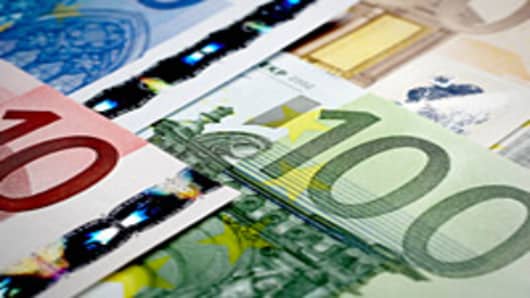Leading economies told Europe it must put up extra money to fight its debt crisis if it wants more help from the rest of the world, piling pressure on Germany to drop its opposition to a bigger European bailout.
Euro zone countries pledged on Sunday at a Group of 20 meetings of finance leaders to reassess the strength of their bailout fund in March, which could clear the way for other G20 countries to give more funds to the International Monetary Fund .
"This will provide an essential input in our ongoing consideration to mobilize resources to the IMF," the G20 said in its final communique after the two-day meeting of finance ministers and central bankers here ended.
Germany, as Europe's largest economy, came under intense pressure to support enlarging the region's war chest. But facing political hurdles at home, it has sent conflicting signals over whether it was ready to move.
British finance minister George Osborne left no doubt that the G20 wants a clear euro-zone commitment.
"We have to see the color of the eurozone's money first — and, quite frankly, that hasn't happened. Until it does, there's no question of extra IMF money from Britain or probably anyone else," he said.
The G20 is racing to line up massive international resources worth nearly $2 trillion — including existing and new funds — possibly by late April. That would help to draw a line under the financial crisis that erupted in 2008 when Lehman Brothers collapsed, spawned the deepest U.S. recession since the 1930s and now has engulfed Europe's deeply indebted countries.
It would mark their boldest move since they ploughed $1 trillion into their economies three years ago to combat recession. Many advanced economies are still flooding markets with cheap money to fuel growth and prevent financial contagion.
Yet the world economic recovery remains patchy and risks are still high that it could stumble, the G20 finance officials said in the communique.
Germany's Finance Minister Wolfgang Schaeuble promised in Mexico City to make a decision some time in March on strengthening Europe's bailout fund.
The proposal is to merge Europe's temporary and permanent bailout funds to create a 750 billion euro ($1 trillion) war chest. This would open the door for other G20 countries, like Japan and China, to meet the IMF's request for $500-$600 billion in new resources, on top of its current $385 billion in funds.
Put together, this would total almost $2 trillion in firepower. The G20 finance chiefs next meet in Washington in late April, and they showed they will not ease pressure on Europe by giving it a signal now that new IMF money is assured.
Yet some progress has been made. U.S. Treasury Secretary Timothy Geithner said on Saturday that Europe had come a long way in laying the foundations for a "credible" crisis response but could not rest there.
"It's important not to rest on that progress ... That progress is in part based on expectations of more progress to come," he said.
Germany Isolated
Germany is sending conflicting signals over whether it would give ground and agree to more European bailout money.
It has argued that toughened fiscal rules already adopted by Europe, which require highly indebted countries to slash their budget deficits, are far more important to restoring market confidence and reviving economic growth. It pointed to narrowing government bond spreads in recent weeks, a G20 official said.
Behind closed doors in Mexico City, Schaeuble appeared more conciliatory. Margrethe Vestager, economy minister of current EU president Denmark, on Saturday said that "even Germany" was reasonably happy to strengthen the bailout fund.
But then it fought in vain for weaker language in the communique, wanting to say that re-assessing the region's financial firepower was "important" for getting more IMF funds, not "essential" as was finally agreed upon, G20 officials said.
And from Berlin, a government official close to Chancellor Angela Merkel insisted on Sunday there is already enough money pledged for the euro-zone's rescue fund.
The United States and some emerging countries struggled to understand Germany's position, another G20 official said.
"They find it difficult to understand the German obsession with fiscal discipline, so Germans were a bit isolated in the meeting and putting the blame on Merkel and on the Bundestag was a way for the German delegation to fight the criticism coming from non-EU countries," one G20 official said.
The new, second Greek bailout package needs approval in Germany's parliament. Lawmakers in the Bundestag lower house will vote on Monday. It is expected to pass with opposition support.
IMF Reforms
Some developing economies have conditions of their own for giving more money to the IMF. Brazil's finance minister said on Saturday that emerging markets wanted implementation of a 2010 reform that would give them more say at the Fund, as well as a bigger European rescue vehicle.
In the communique, the G20 reaffirmed it would stick to that pledge in time for its annual meeting in September.
The world's leading economies also noted risks to growth from rising oil prices, which vaulted to a nearly 10-month high above $125 a barrel on Friday. The G20 welcomed pledges by oil producers to ensure adequate supply.


